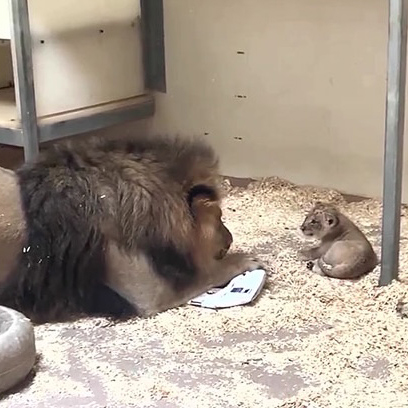In the natural world, it’s not just humans who show deep affection for their children—wild animals are capable of powerful bonds with their offspring too. While many people may already know that species like chimpanzees, bonobos, and gorillas express a wide range of emotions such as happiness, sadness, and even grief, it might come as a surprise to some that lions can also demonstrate tender, emotional behavior—especially when it comes to parenting.

A perfect example of this emotional depth was captured on camera in September at the Denver Zoo. This heartwarming moment occurred inside the lion enclosure, where video footage revealed a beautiful interaction between a male lion named Tobias and his cub, Tatu. The footage quickly gained traction on social media, not just for its touching content, but also because it revealed a softer side of a species often associated with raw power and dominance.
Tatu, a lion cub born on July 25, 2019, has become something of a local celebrity at the zoo. With his boundless curiosity, playful nature, and undeniably adorable appearance, it didn’t take long for him to win over the hearts of both zoo visitors and staff members alike. In fact, the video showcasing his very first encounter with his father was shared online and instantly went viral. Within hours, it had been viewed hundreds of thousands of times and had evoked emotional responses from people around the world.
While the visual of a lion father meeting his cub for the first time is already compelling, there’s a much deeper significance to Tatu’s birth. According to DenverZoo.org, “Half of Africa’s lions have disappeared in the past 25 years and the species faces growing threats from poaching, loss of prey, and destruction of natural habitats.” Given the increasingly precarious status of wild lions, every birth in captivity—especially within programs designed to preserve genetic diversity—is an important step in ensuring the species’ survival.
Tatu is the third cub born to his mother, Neliah, but he is the very first offspring for his father, Tobias. And that matters quite a bit. Tobias’s genetic background is unique within the Association of Zoos and Aquariums (AZA) Lion Species Survival Plan, a program specifically created to protect and manage the lion population in accredited zoos across North America. Since Tobias had never fathered cubs before, the birth of Tatu represents a significant genetic contribution to the overall health of the captive lion population.
But aside from the biological and conservation importance, what truly captured people’s hearts was the emotional connection seen in the video between father and son. There was a moment of curiosity and almost human-like tenderness as Tobias approached his cub for the first time. Rather than showing aggression or disinterest, which can sometimes happen in the animal kingdom, especially with big cats, Tobias seemed genuinely fascinated and even gentle as he engaged with his new son. For many viewers, it was a moving reminder that animals are capable of much more emotional depth than we often give them credit for.
Though the scene was undeniably beautiful, it also stirred mixed emotions for some animal lovers. A few commenters expressed concern, pointing out that in certain circumstances, adult male lions in the wild have been known to harm their own cubs, particularly when asserting dominance or during pride takeovers. However, the context here is entirely different. In a well-managed and secure environment like the Denver Zoo, where expert caretakers oversee every aspect of animal welfare, the risks are greatly minimized. This allowed for a controlled introduction and a moment that could be safely shared with the world.
As the cub continues to grow, so too does the bond between him and his parents. Staff at the Denver Zoo have noted how engaged and attentive Neliah has been in raising Tatu, and now with Tobias also showing interest, it creates a healthy family dynamic that benefits the cub in numerous ways. These early social interactions are critical for a lion cub’s development, not only physically but emotionally and behaviorally. It’s in these moments—playing, exploring, and learning from parents—that a young lion acquires the skills needed for life, even in captivity.
Moreover, Tatu’s public debut and the widespread sharing of his story underscore the critical role that zoos can play in conservation and education. By highlighting personal stories like Tatu’s, zoos have the unique ability to connect people emotionally to the animals they might never encounter in the wild. This emotional connection can translate into greater awareness and support for conservation efforts, not just for lions but for countless other species at risk.
In a world where so many wildlife populations are facing increasing pressure due to human activity, every successful birth, every new life, carries a weight of hope. Tatu represents more than just an adorable baby lion—he symbolizes the success of conservation programs and the potential for humans and animals to coexist with mutual respect and care. His birth reminds us why such programs are necessary and how important it is to protect and nurture not just individual animals but entire ecosystems.
So, while the video of Tobias meeting his cub may last only a few moments, its impact is far-reaching. It touches hearts, sparks conversations, and brings much-needed attention to a species that needs our help. And perhaps, most importantly, it offers a glimpse into the emotional lives of animals—lives full of complexity, connection, and love.
In the end, it’s not just about survival—it’s about the quality of that survival, the relationships that make it meaningful, and the shared moments that remind us just how alike we truly are. From the wild savannas of Africa to the carefully managed habitats of modern zoos, the bond between parent and child continues to be one of the most powerful forces in nature.





